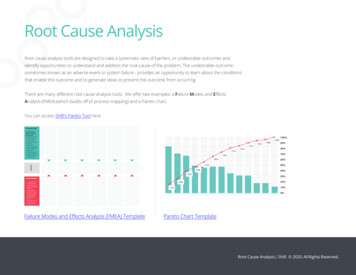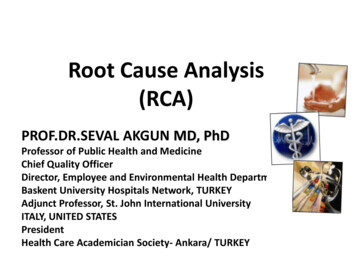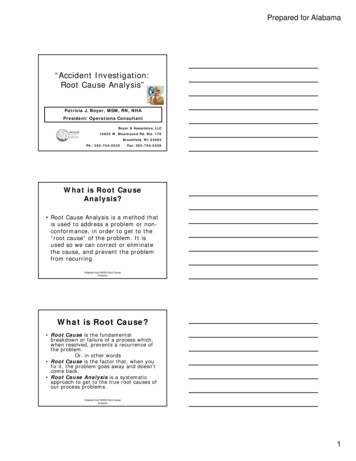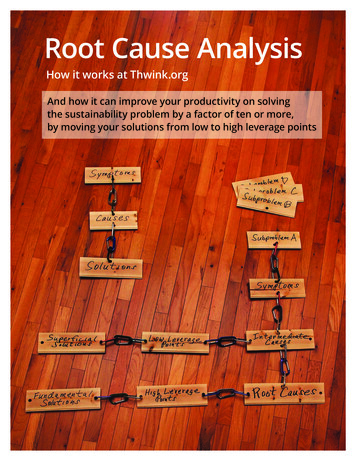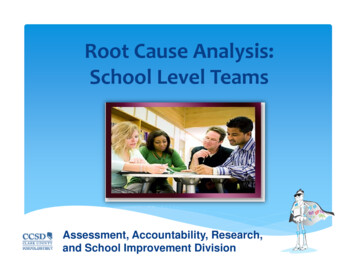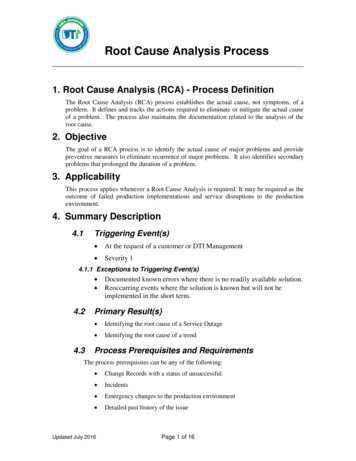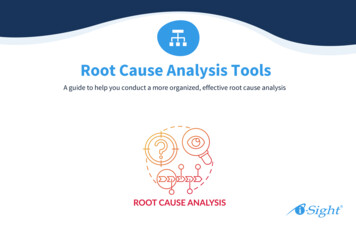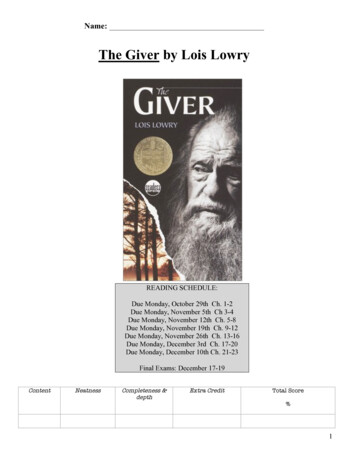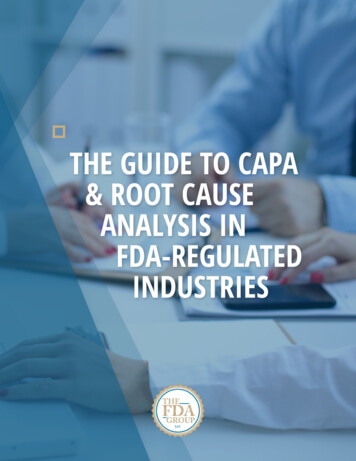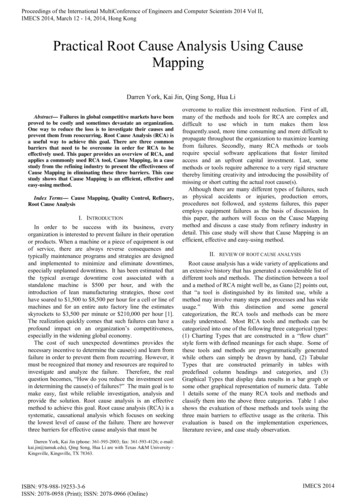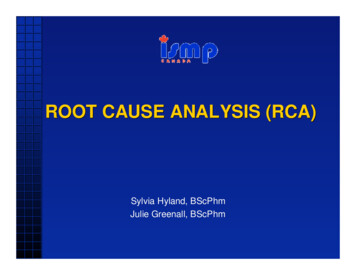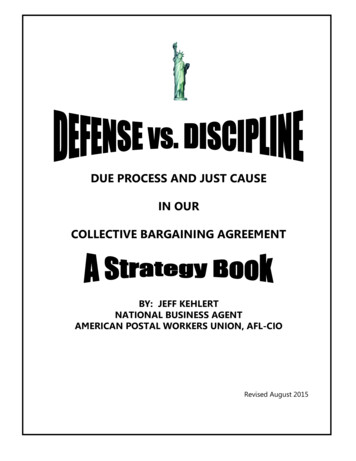
Transcription
DUE PROCESS AND JUST CAUSEIN OURCOLLECTIVE BARGAINING AGREEMENTBY: JEFF KEHLERTNATIONAL BUSINESS AGENTAMERICAN POSTAL WORKERS UNION, AFL-CIORevised August 2015A STRATEGY BOOK: DEFENSE vs. DISCIPLINE: DUE PROCESS AND JUST CAUSEIN OUR COLLECTIVE BARGAINING AGREEMENTJEFF KEHLERT * National Business Agent * America Postal Workers Union, AFL-CIORevised August 20151
FOREWORDThis handbook, which was my twelfth as a National Officer, continues to be designed to placeinto a single accessible package the strategies necessary for members, stewards, officers, andarbitration advocates to provide the best possible defenses when disciplinary actions are imposed. Through strategic use of the Just Cause definition, the Article 17 interview and theCollective Bargaining Agreement, this Strategy Book is intended to promote thorough andwell-reasoned grievance initiation, investigation, processing and arbitration advocacy in disciplinary instances.Procedural and due process issues increasingly have, over the years, replaced arguments “onthe merits”. Now, more than ever, we must utilize Just Cause as it is defined and as it is required to be applied by management, the arbitrators, and yes, by stewards and advocates.We win a far greater percentage of disciplinary cases based upon due process then we everhave in the past; but too many valuable and job-saving due process and just cause arguments are never explored much less pursued. It is my hope that this Handbook will continueto enable stewards and advocates to successfully develop and prove the arguments to betterdefend our members.Following the introductory section covering Just Cause, each of the next 23 chapters discusses in detail a particular due process, just cause subject. Included are a definition and explanation of the Issue, The Union’s Argument, The Applicable Collective Bargaining Agreementand Joint Contract Interpretation Manual Provisions and/or National Level Arbitration Mandates, The Article 17 Interview, and Regional Arbitral Reasoning and Support.Although some parts of this Handbook are directed more to the shop steward than to thearbitration advocate – and vice versa – all the information contained herein should provideeveryone in our Union with a better understanding and ability to deal with the disciplinaryprocess and the defenses necessary to protect the membership.Yours for Education in our Union, I remain,Jeff KehlertNational Business AgentAmerican Postal Workers Union, 9) 937-2993 – Cell(856) 740-0115 – OfficeA STRATEGY BOOK: DEFENSE vs. DISCIPLINE: DUE PROCESS AND JUST CAUSEIN OUR COLLECTIVE BARGAINING AGREEMENTJEFF KEHLERT * National Business Agent * America Postal Workers Union, AFL-CIORevised August 20152
ACKNOWLEDGMENTSMany thanks to the following Union Leaders who have contributed to the advancement ofDue Process strategies:Paul CirinoPresident, Lancaster Area Local APWUPresident, Pennsylvania State Postal Workers UnionLu-Ann GlaserPresident, Keystone Area Local APWUDirector, Publicity & LegislationPennsylvania State Postal Workers UnionBill LewisPresident, Trenton Metro Area Local APWUPresident, New Jersey State Postal Workers UnionBob PitchalonisClerk Craft Director, Pennsylvania State Postal Workers UnionClerk Craft Director, Philadelphia BMC Local APWUJohn L. Jackson, Jr.National Business Agent, Clerk Craft, Philadelphia RegionRobert RomanowskiNational Business Agent, Clerk Craft, Philadelphia RegionAnn Albro-MathieuPresident, Providence Rhode Island Area Local APWUTHEY HAVE MADE THE DIFFERENCEI also thank the following National Business Agents who responded to my request for additional arbitral reference, some of which appears in this Strategy Book:Steve AlbaneseNational Business Agent – Clerk Craft, Boston RegionJohn ClarkNational Business Agent – Clerk Craft, Chicago RegionJohn KellyNational Business Agent – Clerk Craft, Denver RegionLyle KruethNational Business Agent – Clerk Craft, Minneapolis RegionA STRATEGY BOOK: DEFENSE vs. DISCIPLINE: DUE PROCESS AND JUST CAUSEIN OUR COLLECTIVE BARGAINING AGREEMENTJEFF KEHLERT * National Business Agent * America Postal Workers Union, AFL-CIORevised August 20153
DEDICATIONThis Handbook is dedicated to my wife, Congetta. Withouther enthusiasm, wisdom, intuition and commitment to thecause, it would not have come into being.SPECIAL RECOGNITIONI gratefully acknowledge the critically important contributions of Providence Rhode Island Area Local President AnnAlbro-Mathieu and National Business Agents RobertRomanowski and John Louis Jackson, Jr. for their roles as coauthors of the Progressive Discipline for PSEs, Chapter 24.They are the first Union Educators to so author a portion ofDEFENSE VS. DISCIPLINE.A STRATEGY BOOK: DEFENSE vs. DISCIPLINE: DUE PROCESS AND JUST CAUSEIN OUR COLLECTIVE BARGAINING AGREEMENTJEFF KEHLERT * National Business Agent * America Postal Workers Union, AFL-CIORevised August 20154
TABLE OF CONTENTSFORWARD . 3ACKNOWLEDGEMENTS . 4DEDICATION . 5INTRODUCTION . 8CHAPTER 1 – Just Cause. 10CHAPTER 2 – The Pre-Disciplinary Interview . 25Including: Pre-Disciplinary Interview; For Preference Eligible Employee;Pre-Disciplinary Interview for Employee Discharge After A Last ChanceAgreementCHAPTER 3 – Investigation Prior to Discipline’s Initiation . 41CHAPTER 4 – Higher Level Review and Concurrence . 49CHAPTER 5 – Authority to Resolve the Grievance at the Lowest Possible Step . 60CHAPTER 6 – Denial of Information. 68CHAPTER 7 – Nexus Between Off-Duty Misconduct & USPS Employment . 78CHAPTER 8 – Timeliness of Discipline . 86CHAPTER 9 – Disparate Treatment . 92CHAPTER 10 – Higher Level Concurring Official as Step 2 Designee . 102CHAPTER 11 – Double Jeopardy/Res Judicata . 108CHAPTER 12 – Disparate Elements of Past Discipline Relied UponFor Progression . 114CHAPTER 13 – Past Elements of Discipline Not Adjudicated YetRelied Upon in Subsequent Discipline. 120CHAPTER 14 – Modified Past Elements of Discipline Not CitedIn Modified State in Subsequent Discipline . 127CHAPTER 15 – Placement in Off-Duty Status Outside Article 16.7 Reasons . 134A STRATEGY BOOK: DEFENSE vs. DISCIPLINE: DUE PROCESS AND JUST CAUSEIN OUR COLLECTIVE BARGAINING AGREEMENTJEFF KEHLERT * National Business Agent * America Postal Workers Union, AFL-CIORevised August 20155
CHAPTER 16 – Placement in Off-Duty Status Without Post-PlacementWritten Notification . 138CHAPTER 17 – Placement in Off-Duty Status Following Time Lapse. 141CHAPTER 18 – 30 Day Advance Notice . 145CHAPTER 19 – Statement of Back Pay Mitigation in Notices of Removals &Indefinite Suspension/Crime Situation . 151CHAPTER 20 – Postal Inspection Service/Office of Inspector General InterferenceIn the Article 15 and/or Article 16 Dispute and/or Discipline Process. 155CHAPTER 21 – USPS Witness as Initiator of Discipline . 170CHAPTER 22 – Placement in Off-Duty Status – Excessive Duration 174CHAPTER 23 – Supervisor/Manager Other Than The Immediate Supervisorof the Grievant Meets With & Discusses Grievance At Step 1 . .188CHAPTER 24 - PSEs Issued Non-Corrective, Non-Progressive Discipline .198Appendix . A1–A3List of Strategy Book Series .A4-A5A STRATEGY BOOK: DEFENSE vs. DISCIPLINE: DUE PROCESS AND JUST CAUSEIN OUR COLLECTIVE BARGAINING AGREEMENTJEFF KEHLERT * National Business Agent * America Postal Workers Union, AFL-CIORevised August 20156
INTRODUCTIONBefore we begin with the just cause discussion, a requirement in grievance processing mustbe emphasized. WE MUST RAISE OUR JUST CAUSE AND DUE PROCESS ISSUES AND ARGUMENTS IN SPECIFIC DETAIL NO LATER THAN IN THE WRITTEN STEP 2 APPEAL. Article 15 of the Collective BargainingAgreement states:ARTICLE 15 GRIEVANCE-ARBITRATION PROCEDURESection 2. Grievance Procedure StepsStep 1:(d)The Union shall be entitled to appeal an adverse decision to Step 2 of thegrievance procedure within ten (10) days after receipt of the supervisor’s decision. Such appeal shall be made by completing a standard grievance form developed by agreement of the parties, which shall include appropriate space forat least the following:1.2.3.4.Detailed statement of facts;Contentions of the grievant;Particular contractual provisions involved; andRemedy sought.Step 2(d):At the meeting the Union representative shall make a full and detailedstatement of facts relied upon, contractual provisions involved, and remedy sought. The Union representative may also furnish written statementsfrom witnesses or other individuals. The Employer representative shall also make a full and detailed statement of facts and contractual provisionsrelied upon. The parties’ representatives shall cooperate fully in the effort to develop all necessary facts, including the exchange of copies of allrelevant papers or documents in accordance with Article 31. The parties’representatives may mutually agree to jointly interview witnesses wheredesirable to assure full development of all facts and contentions. In addition, in cases involving discharge either party shall have the right to present no more than two witnesses. Such right shall not preclude the partiesfrom jointly agreeing to interview additional witnesses as providedabove.A STRATEGY BOOK: DEFENSE vs. DISCIPLINE: DUE PROCESS AND JUST CAUSEIN OUR COLLECTIVE BARGAINING AGREEMENTJEFF KEHLERT * National Business Agent * America Postal Workers Union, AFL-CIORevised August 20157
This is the “full disclosure” stage of our grievance/arbitration procedure. We have a contractually required obligation to raise our issues and arguments in detail in our Step 2 appeal orat the Step 2 meeting. Should we fail to raise those arguments at Step 2, management willargue the Union failed to meet its obligation in pursuit of the grievance.Management will argue their due process rights to address the issues and arguments at thelowest possible step--and thus the possibility of lowest possible step resolution--are violated.Management will, in effect, turn the tables on us and pursue their own due process issues ifwe fail to fully raise our issues and arguments at Step 2. We must remember that in recentyears, the Union has been highly successful in winning due process arguments within thegrievance/arbitration procedure and at arbitration. Due process violations in disciplinary cases--such as the improperly conducted Pre-Disciplinary Interview--and in contract cases--suchas the lack of proper grievance appeal language in letters of demand--have resulted in a solid history of successful grievance processing. As we have pursued these due process violations to successful ends, management has increasingly sought and pursued due process issues against the Union. Their education in due process is directly related to our successes.For these reasons, we can expect management to raise every due process issue which presents itself, and in particular, our obligation to raise our issues and arguments no later thanat Step 2.Without a commitment and practice to full development of our arguments through thoroughgrievance investigation and processing, we will see many valuable Union due process issuesand USPS violations excluded by arbitrators and of no assistance to the defense of membersin need.A STRATEGY BOOK: DEFENSE vs. DISCIPLINE: DUE PROCESS AND JUST CAUSEIN OUR COLLECTIVE BARGAINING AGREEMENTJEFF KEHLERT * National Business Agent * America Postal Workers Union, AFL-CIORevised August 20158
CHAPTER 1JUST CAUSEOne of the most misunderstood concepts and requirements of our Collective Bargainingagreement is the Just Cause mandate under Article 16. Managers are often not held to provingthey issued discipline for Just Cause. Arbitrators are often not held to issuing decisions whichapply the standards of Just Cause. Grievances are often not investigated, processed, and presented ina method requiring management to meet the tests of Just Cause.We begin where Just Cause first appears in our Collective Bargaining Agreement:“ARTICLE 16 DISCIPLINE PROCEDURESection 1. PrinciplesIn the administration of this Article, a basic principle shall be that disciplineshould be corrective in nature, rather than punitive. No employee may be disciplined or discharged except for just cause such as, but not limited to, insubordination, pilferage, intoxication (drugs or alcohol), incompetence, failure to perform work as requested, violation of the terms of this Agreement, or failure toobserve safety rules and regulations. Any such discipline or discharge shall besubject to the grievance-arbitration procedure provided for in this Agreement,which could result in reinstatement and restitution, including back pay.”The EL-921The above quoted provision explains that Management must have just cause to issue discipline, but the provision does not explain what just cause is. In Collective Bargaining Agreements throughout the United States, ours may be unique in that we have a clear definition ofwhat just cause is. That definition is found in the EL-921 Handbook, Supervisor's Guide toHandling Grievances, under Article 19 of the Collective Bargaining Agreement:The Principles of Just CauseThe main purpose of any disciplinary action is to correct undesirable behavior on thepart of an employee. All disciplinary actions must be for just cause and, in the majorityof cases, the action taken should be progressive and corrective in nature.As stated earlier in this guide, it is typically the Postal Service’s burden to prove that alldisciplinary actions are issued for just cause.A STRATEGY BOOK: DEFENSE vs. DISCIPLINE: DUE PROCESS AND JUST CAUSEIN OUR COLLECTIVE BARGAINING AGREEMENTJEFF KEHLERT * National Business Agent * America Postal Workers Union, AFL-CIORevised August 20159
The definition of just cause varies from case to case, but arbitrators frequently dividethe question of just cause into six sub-questions and often apply the following criteriato determine whether the action was for just cause.These criteria are the basic considerations that the supervisor uses before initiatingdisciplinary action. Discipline should not be issued if “No” is the answer to any of thequestions.The following is the list of six sub-questions:1. Is there a rule? If so, was the employee aware of the rule? Was the employeeforewarned of the disciplinary consequences for failure to follow the rule?It is not enough to say, “Well, everybody knows that rule,” or, “We posted that ruleten years ago.” You should be prepared to present the document(s) that supportsthat the employee knew, or reasonably should have known, the rule (posting andlocation, previous discipline, relevant sections of handbooks, regulations, etc.)Certain standards of conduct are normally expected in the work place, and itis assumed by arbitrators that employees should be aware of these standards. For example, an employee charged with intoxication on duty, fightingon duty, pilferage, sabotage, or insubordination, may generally be assumedto have understood that these offenses are neither condoned nor acceptable, regardless of whether management has issued specific regulations tothat effect.2. Is the rule a reasonable rule?Management must make sure rules are reasonable, based on the overall objectiveof safe and efficient work performance. Rules should be reasonably related tobusiness efficiency, safe operation of our business, and the performance we mightexpect of the employee.3. Is the rule consistently and equitably enforced?A rule must be applied fairly and without discrimination. Consistent and equitableenforcement is a critical factor. Consistently overlooking employee infractions andthen disciplining without warning is improper. For example, if employees are consistently allowed to smoke in areas designated as No Smoking areas, it is not appropriate to suddenly start disciplining them for this violation. In such cases, management loses its right to discipline for that infraction, in effect, unless it first putsemployees (and the unions, when appropriate) on notice of its intent to enforcethat regulation.A STRATEGY BOOK: DEFENSE vs. DISCIPLINE: DUE PROCESS AND JUST CAUSEIN OUR COLLECTIVE BARGAINING AGREEMENTJEFF KEHLERT * National Business Agent * America Postal Workers Union, AFL-CIORevised August 201510
Singling out employees for discipline is another issue. If several similarly situatedemployees commit an offense, it would not be equitable to discipline only one.4. Was a thorough investigation completed?When considering disciplinary action, management must investigate to determinewhether the employee committed the offense. Management must ensure that itsinvestigation is thorough and objective. This includes the employee’s “day in courtprivilege.” Employees have the right to know with reasonable detail what thecharges are and need to be given a reasonable opportunity to defend themselvesbefore the discipline is initiated.The investigation should also include a review of the employees past record in order to determine what, if any, action is appropriate and/or warranted. When indoubt supervisors are encouraged to consult with their managers or with the District Labor Relations office.5. Was the severity of the discipline reasonably related to the infraction itselfand in line with that usually administered, as well as to the seriousness of theemployee’s past record?The following is an example of what arbitrators may consider an inequitablediscipline: If an installation consistently issues seven-day suspensions for a particular offense, it would be extremely difficult to justify why an employee with a similarrecord was issued a thirty-day suspension for the same offense under like circumstances.There is no precise definition of what establishes a good, fair, or bad record.Reasonable judgment must be used. An employee’s record of previous offensesmay not be used to establish guilt in a case you presently have under consideration, but it may be used to determine the appropriate disciplinary penalty.6. Was the disciplinary action taken in a timely manner?Disciplinary actions should be taken as promptly as possible after the offense hasbeen committed.The Daugherty ‘Tests’ of Just CauseThe definition of Just Cause stated in the EL-921 is based upon the benchmark definitiondeveloped and first stated by Arbitrator Carroll R. Daugherty in the Grief Brothers Cooperage Corp. decision in 1964 and in a later decision, Enterprise Wire Company (1966). InEnterprise Arbitrator Daugherty stated:A STRATEGY BOOK: DEFENSE vs. DISCIPLINE: DUE PROCESS AND JUST CAUSEIN OUR COLLECTIVE BARGAINING AGREEMENTJEFF KEHLERT * National Business Agent * America Postal Workers Union, AFL-CIORevised August 201511
“Few if any union-management agreements contain a definition of "just cause."Nevertheless, over the years the opinions of arbitrators in innumerable discipline cases have developed a sort of "common law" definition thereof. This definition consists of a set of guidelines or criteria that are to be applied to thefacts of any one case, and said criteria are set forth below in the form of questions.A no answer to any one or more of the following questions normally signifiesthat just and proper cause did not exist. In other words, such no means that theemployer's disciplinary decision contained one or more elements of arbitrary,capricious, unreasonable, or discriminatory action to such an extent that saiddecision constituted an abuse of managerial discretion warranting the arbitrator to substitute his judgment for that of the employer.The Questions1. Did the company give to the employee forewarning or foreknowledge ofthe possible or probable disciplinary consequences of the employee'sconduct?Note 1: Said forewarning or foreknowledge may properly have beengiven orally by management or in writing through the medium of typedor printed sheets or books of shop rules and of penalties for violationthereof.Note 2: There must have been actual oral or written communication ofthe rules and penalties to the employee.Note 3: A finding of lack of such communication does not in all casesrequire a no answer to question 1. This is because certain offenses suchas insubordination, coming to work intoxicated, drinking intoxicatingbeverages on the job, or theft of the property of the company or of fellow employees are so serious that any employee in the industrial societymay properly be expected to know already that such conduct is offensiveand heavily punishable.Note 4: Absent any contractual prohibition or restriction, the companyhas the right unilaterally to promulgate reasonable rules and give reasonable orders; and same need not have been negotiated with the union.A STRATEGY BOOK: DEFENSE vs. DISCIPLINE: DUE PROCESS AND JUST CAUSEIN OUR COLLECTIVE BARGAINING AGREEMENTJEFF KEHLERT * National Business Agent * America Postal Workers Union, AFL-CIORevised August 201512
2. Was the company's rule or managerial order reasonably related to (a)the orderly, efficient, and safe operation of the company's business and(b) the performance that the company might properly expect of the employee?Note: If an employee believes that said rule or order is unreasonable, hemust nevertheless obey same (in which case he may file a grievancethereover), unless he sincerely feels that to obey the rule or order wouldseriously and immediately jeopardize his personal safety and/or integrity. Given a firm finding to the latter effect, the employee may properlybe said to have had justification for his disobedience.3. Did the company, before administering discipline to an employee, makean effort to discover whether the employee did in fact violate or disobeya rule or order of management?Note 1: This is the employee's "day in court" principle. An employee hasthe right to know with reasonable precision the offense with which he isbeing charged and to defend his behavior.Note 2: The company's investigation must normally be made before itsdisciplinary decision is made. If the company fails to do so, its failuremay not normally be excused on the ground that the employee will gethis day in court through the grievance procedure after the exaction ofdiscipline. By that time, there has usually been too much hardening ofpositions. In a very real sense, the company is obligated to conduct itselflike a trial court.Note 3: There may, of course, be circumstances under which management must react immediately to the employee's behavior. In such cases,the normally proper action is to suspend the employee pending investigation, with the understanding that (a) the final disciplinary decision willbe made after the investigation and (b), if the employee is found innocent after the investigation, he will be restored to his job with full pay fortime lost.Note 4: The company's investigation should include an inquiry into possible justification for the employee's alleged rule violation.4. Was the company's investigation conducted fairly and objectively?Note 1: At said investigation the management official may be both"prosecutor" and "judge," but he may not also be a witness against theemployee.A STRATEGY BOOK: DEFENSE vs. DISCIPLINE: DUE PROCESS AND JUST CAUSEIN OUR COLLECTIVE BARGAINING AGREEMENTJEFF KEHLERT * National Business Agent * America Postal Workers Union, AFL-CIORevised August 201513
Note 2: It is essential for some higher, detached management official toassume and conscientiously perform the judicial role, giving the commonly accepted meaning to that term in his attitude and conduct.Note 3: In some disputes between an employee and a management person, there are not witnesses to an incident other than the two immediate participants. In such cases, it is particularly important that the management "judge" question the management participant rigorously andthoroughly, just as an actual third party would.5. At the investigation, did the "judge" obtain substantial evidence orproof that the employee was guilty as charged?Note 1: It is not required that the evidence be conclusive or "beyond allreasonable doubt." But the evidence must be truly substantial and notflimsy.Note 2: The management "judge" should actively search out witnessesand evidence, not just passively take what participants or "volunteer"witnesses tell him.Note 3: When the testimony of opposing witnesses at the arbitrationhearing is irreconcilably in conflict, an arbitrator seldom has any meansfor resolving the contradictions. His task is then to determine whetherthe management "judge" originally had reasonable grounds for believing the evidence presented to him by his own people.6. Has the company applied its rules, orders, and penalties even-handedlyand without discrimination to all employees?Note 1: A no answer to this question requires a finding of discriminationand warrants negation or modification of the discipline imposed.Note 2: If the company has been lax in enforcing its rules and ordersand decides henceforth to apply them rigorously, the company mayavoid a finding of discrimination by telling all employees beforehand ofits intent to enforce hereafter all rules as written.7. Was the degree of discipline administered by the company in a particular case reasonably related to (a) the seriousness of the employee's proven offense and (b) the record of the employee in his service with thecompany?A STRATEGY BOOK: DEFENSE vs. DISCIPLINE: DUE PROCESS AND JUST CAUSEIN OUR COLLECTIVE BARGAINING AGREEMENTJEFF KEHLERT * National Business Agent * America Postal Workers Union, AFL-CIORevised August 201514
Note 1: A trivial proven offense does not merit harsh discipline unlessthe employee has properly been found guilty of the same or other offenses a number of times in the past. (There is no rule as to what numberof previous offenses constitutes a "good," a "fair," or a "bad" record.Reasonable judgement thereon must be used.)Note 2: An employee's record of previous offenses may never be usedto discover whether he was guilty of the immediate or latest one. Theonly proper use of his record is to help determine the severity of discipline once he has properly been found guilty of the immediate offense.Note 3: Given the same proven offense for two or more employees, theirrespective records provide the only proper basis for "discriminating"among them in the administration of discipline for said offense. Thus, ifemployee A's record is significantly better than those of employees B, C,and D, the company may properly give A a lighter punishment than itgives the others for the same offense; and this does not constitute truediscrimination.Note 4: Suppose that the record of the arbitration hearing establishedfirm yes answers to the first six questions. Suppose further that the proven offense of the accused employee was a serious one, such as drunkenness on the job; but the employee's record had been previously unblemished over a long, continuous period of employment with the company.Should the company be held arbitrary and unreasonable if it decided todischarge such an employee? The answer depends of course on all thecircumstances. But, as one of the country's oldest arbitration agencies,the National Railroad Adjustment Board, has pointed out repeatedly ininnumerable decisions on discharge cases, leniency is the perogative ofthe employer rather than of the arbitrator; and the latter is not supposedto substitute his judgment in this area for that of the company unlessthere is compelling evidence that the company abused its discretion.This is the rule, even though an arbitrator, if he had been the original"judge," might have imposed a lesser penalty. Actually, the arbitratormay be said, in an important sense, to act as an appellate tribunal whosefunction is to discover whether the decision of the trial tribunal (the employer) was within the bounds of reasonableness above set forth. In general, the penalty of dismissal for a really serious first offense does not, initself, warrant a finding of company unreasonableness.A STRATEGY BOOK: DEFENSE vs. DISCIPLINE: DUE PROCESS AND JUST CAUSEIN OUR COLLECTIVE BARGAINING AGREEMENTJEF
Section 2. Grievance Procedure Steps Step 1: (d)The Union shall be entitled to appeal an adverse decision to Step 2 of the grievance procedure within ten (10) days after receipt of the supervisor's deci-sion. Such appeal shall be made by completing a standard grievance form de-
